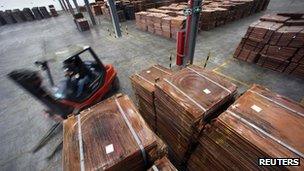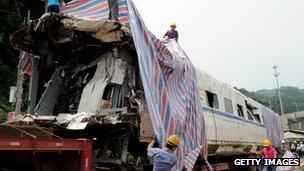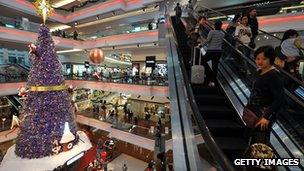Has China's economy run out of steam?
- Published

For the last 30 years, people have learned to take China's rapid economic growth for granted
While all eyes are on the eurozone, might the world be overlooking an even bigger crisis brewing in China?
Several indicators have begun to point to an economic downturn in the country, including <link> <caption>sharp slowdowns in electricity demand and industrial production</caption> <url href="http://news.xinhuanet.com/english/china/2012-05/14/c_131587263.htm" platform="highweb"/> </link> , as well as in <link> <caption>factory output and retail sales</caption> <url href="http://www.bbc.co.uk/news/business-18030674" platform="highweb"/> </link> .
China has already been suffering for several months from the chill wind blowing from Europe - its biggest export market, even bigger than the US.
The country's manufacturing sector <link> <caption>has been contracting for the last seven months</caption> <url href="http://www.markiteconomics.com/MarkitFiles/Pages/ViewPressRelease.aspx?ID=9563" platform="highweb"/> </link> thanks mainly to weak export demand, according to a regular survey carried out by HSBC.
Speculators
This slowdown might not be cause for alarm, were it not for the fact that the wealthier Chinese appear to be rattled.
Money has more or less stopped flowing into China since September, <link> <caption>and in April actually began to leave the country</caption> <url href="http://www.bloomberg.com/news/2012-05-16/chinese-banks-forex-sales-may-indicate-capital-outflows.html" platform="highweb"/> </link> .
This is highly unusual.
China is normally accused by the US and others of keeping its currency, the yuan, artificially cheap against the dollar in order to give its exporters an unfair price advantage.
To make sure the yuan doesn't strengthen too much, China blocks speculators from buying the currency.
In other words, if you were lucky enough already to own yuan, the last thing you would normally want to do is to sell them for overvalued dollars.
For almost two years since mid-2010, the government has dutifully allowed the yuan to strengthen against the dollar.
But in the last month, as the economy has got into trouble, it started to push the yuan's value down again.
The problem is that it's not just the yuan that has become less of an attractive investment.
Property bust?
During the last three years, Chinese investors have poured their money into the country's property construction boom.
For example, many firms financed the import of raw materials such as copper, iron ore and aluminium for the building industry.
It also provided a roundabout way for them to speculate on the strength of the yuan.
But it seems they went too far. The unused copper shipments piling up in China's warehouses have become so great that <link> <caption>the overflow is being stored in staff car parks and driveways</caption> <url href="https://research.standardchartered.com/configuration/ROW%20Documents/Copper_%E2%80%93_Cu_at_the_warehouses_26_04_12_11_35.pdf" platform="highweb"/> </link> .
Meanwhile the construction boom <link> <caption>seems to have ground to a halt</caption> <url href="http://chovanec.wordpress.com/2012/05/16/china-real-estate-unravels/" platform="highweb"/> </link> .
Total property sales dropped 12% in the first four months of the year, compared with a year ago. In response, the number of new construction projects fell 15% in April, while purchases of land fell by more than half.

Copper stocks may suggest that the building boom is over
This could of course be nothing more than a short-term blip. But the fear is that it could be the beginning of the end of a building boom that has created far more apartments than the country really needs.
Since the beginning of 2009, China has built 2.3 billion square metres of residential property space. A further 3.2 billion is still under construction, which developers now appear to be rushing to complete and sell off before the market gets any worse.
That is enough new floorspace to house between 200 and 250 million people.
To get that in context, the World Bank forecasts that, even at the current rapid rate of urbanisation in China, it will take about 15 years for a further 200 million Chinese to move off the land into the country's exploding cities.
There are stories of <link> <caption>entire new ghost towns</caption> <url href="http://www.youtube.com/watch?v=0brcZTVde-I&feature=youtu.be" platform="highweb"/> </link> having been built.
It seems many of these empty flats were being bought by Chinese businesses and families as an investment, in preference to leaving their money in a low-interest bank account.
High speed
Apartment blocks are only one element of China's construction boom.

High-speed rail construction was halted for several months after the Wenzhou crash
In 2008, in response to the global financial crisis and imminent recession, the Chinese government announced a massive $590bn spending splurge over the next two years.
It did the trick - China's growth rate barely dropped below the magic 10% figure at a time when the West fell into its deepest recession since World War II.
A lot of that money poured into infrastructure - new roads, bridges and airports.
But, just as with the housing boom, China may have overstretched itself.
For example, China has built the world's biggest high-speed rail network, five times the size of France's TGV, from scratch.
But <link> <caption>most Chinese cannot afford the train tickets</caption> <url href="http://www.chinadaily.com.cn/cndy/2011-01/12/content_11831362.htm" platform="highweb"/> </link> . And the regular trains that they can afford have actually become less frequent as they make room for the shiny new high-speed trains.
And it seems the lines were built in too much of a rush - a string of dangerous incidents, including a major train crash at Wenzhou, have been blamed on poor design and shoddy building work.
Political struggle
Why might all this be the prelude to a crisis? Well, there are three things to keep an eye on.
First of all, a lot of the construction was financed by a tripling of lending by China's state-owned banks ordered by the authorities, as well as a boom in more shadowy sources of finance.
To the extent that those loans have been wasted and cannot be repaid, the banks and other lenders could be facing big losses.
Although the banks (and many of the big state-owned borrowers) will probably be bailed out by the government if required, a financial crisis could still lead to a crackdown on lending that pushes many private sector borrowers to the wall.

China's leaders are betting on consumer spending to create the new jobs that will be needed
Secondly, construction and other forms of investment take up a huge share of the country's economy. If there is a sudden halt in much of this activity, it begs the question what will happen to all the construction workers and other people employed by these industries?
In its latest five-year plan, the government is betting on a consumer boom - in other words, all those workers can get jobs in retail and distribution and personal services.
But, although consumer spending has been rising at 10%-15% every year for the last decade or more, even this rate may not be fast to make up the difference, for the simple reason that consumption is starting from such a very low base - currently only accounting for a third of all spending in China's economy.
The third reason for concern is political.
China is in the middle of a delicate transition, with a new generation of leaders taking over - something that only happens every 10 years.
There is a political struggle going on - evidenced by the removal of the colourful Chongqing governor Bo Xilai.
A lot of party members have personally done very well out of the building and lending boom of the last three years. If the boom is coming to an end, they will be even more keen not to be among the inevitable losers.
How that struggle plays out - especially if China faces a lot of unemployed workers protesting on the streets - is anyone's guess.